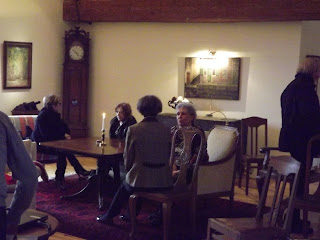 |
| Andre and Walburg |
One of the things I like about the French is that they admire and cultivate learning. They do not belittle their intellectuals and on the whole, my generation of French want to learn more about art, history, music and literature. I can't speak for the current generation; I suspect many of them have been "infected" with cravings for easy entertainment and instant gratification. I hope I am wrong.
Therefore, the conference I attended today might seem pointless or pretentious, I am not sure which would be the worse insult. Organized by Walburg and Harald Probst, the same couple who hosted the "Protestant orphans" luncheon, it featured Andre Bonnery, one of the men from the Protestant congregation. He is a Doctor of the State, which I am guessing is akin to a PhD in U.S. academia. There were about 30 or so of us gathered in their living room, wine and hors d'oeuvres were provided as well as comfortable seating. What a wonderful home they have created in their old winery!
 |
| Thoughtful attention |
Andre's topic was the Migration of the Visigoths as a reference point for discussing modern day immigration. He talked about the root causes of migration in general and in particular, the routes taken by the invading forces, the sacking of Rome in 410, assimilation and the legacy of the Visigoths. Yes, people were actually interested in the history and eager to discuss the modern day problems of immigration.
 |
| Andre gets ready |
It was hard for me to focus merely on Europe and the issue of immigrants from Islamic countries. I kept thinking about the US and its own issues with the influx of Latino migrants and the challenges everyone faces as too many people on the planet move around in search of too few resources. People were respectful and their questions and their comments were thoughtful, and answer-seeking rather than knee-jerk and xenophobic.
Of course, everything was conducted in French. I was glad that it was Andre who was speaking, because he has great diction, even if he does have somewhat of a southern French accent. I got probably 97% of what he was saying. Walburg and I were talking afterward. She is Polish by birth, but her native tongue is German. She has been in France many times longer than I have and she still struggles at times. We agreed that if we really want to learn, we have to push ourselves, whether it be to learn history or the language.
Those who know me will find it hard to believe that I did not contribute to the discussion.. When have I not had something to say about anything? I was able to trade asides with the man sitting next to me, who had a lot to contribute. But my language skills just aren't up to the task in front of so large a group of strangers. My French is definitely better, and improves almost daily, but I get frustrated by not being able to communicate with ease.
 |
| Visiting before the lecture starts |
If the purpose of the conference was to get us to think, it succeeded beyond Walburg's and Andre's greatest expectations. We talked about immigration and history in the car on the way home. I stil have a great deal of thoughts about the subject whirling around in my head. Andre's point was that the Visigoths assimilated, mostly by converting to Catholicism. Today we haven't a state religion (at least in the U.S.) and we have to figure out how to live in a secularly governed country while practicing the religion of our choice.
My points are these, in no particular order:
The simple fact is that there are too many people on the planet.
People in general love their homeland and don't leave their roots unless they are forced out--by hunger, by war, by changing climate. Control those factors, keep living situations stable and generally people will not pull up stakes and relocate. (Yes, I am very much aware of the irony in that statement)
People bind to one another through language and sometimes religion. Immigrants to France are expected to learn to speak French.
The perspective of time changes the tone of the impact of immigration: I am sure that the Romans who had their crops and houses commandeered by the invaders were not as kindly disposed toward the Visigoths as those historians hundreds of years later who admire the vigor and innovation that the Visigoths brought with them.
I don't think anyone expected to come up with answers to the problems of immigration. But I am honored to have been included in a group of people who are willing to sit down and discuss this, without rancor, without name-calling, without pointing fingers. Would that our politicians would do the same.
 |
| Walburg and Harald's "conference room" |
Aucun commentaire:
Enregistrer un commentaire